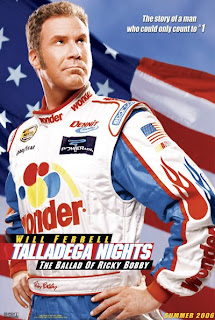ricky bobby, part deux
 Hello dear readers :)
Hello dear readers :) I recently received a note from a rural reader asking just what exactly it is that I am saying. In an effort to reach out to our rural participants, especially those I may or may not be related to, I thought I might fill out some of the thoughts I had about Ricky Bobby.
Dear Eight Pound, Six Ounce, Newborn Baby Jesus, don’t even know a word yet, just a little infant, so cuddly, but still omnipotent. We’d just like to thank you for all the races I’ve won and the $21.2 million, LOVE THAT MONEY!The great thing about Ricky Bobby's prayer is that he makes Jesus look like who he wants him to look like, and so the prayer is a hysterical mish-mash of ideas: "Eight pounds six ounces and omnipotent", the love of money, contractual language, etc. And here's the rub:
Our own prayers are not so different from his. We each create a picture of Jesus, a picture that draws on our own experience and interpretation. How do we know if our picture is right or wrong? Ricky Bobby's prayer seems to miss the mark, but how do you know it?
The first answer, and a good one, is probably something along the lines of, "His prayer contradicts scripture," but the problem is that there is not one clear final interpretation of scripture. In fact, Creflo Dollar might agree with Ricky Bobby, and one look at some of the Psalms might convince you of the same thing. This is not to say that the basic truths aren’t clear, but it is to say that everyone, even the most educated scholar ultimately can only state opinion. After all, if scripture were so clear why there are so many interpretive battles?
This doesn't mean that there are no wrong answers either, it just means we must go to great lengths to discern if our own answers are wrong. We have to know where our blind spots are. Ricky Bobby seems to have some blind spots in consumerism and money, a fair assessment of the blind spots for a lot of western Christians.
If any of this makes sense, then the natural question is “How do we discover our own blind spots?” Leslie Newbigin, a missionary/theologian I admire for more than just his ambiguously gendered name, argues in The Gospel in a Pluralist Society that it is cross cultural exchange that show us what we cannot see. It is in conversation, dialogue, and exposure to other points of view that challenge the assumptions we cannot see, and the possibility is raised we might be a bit wrong! And so we must look out side our ministries, churches, families and systems to leanr what it is we are unable to hear on our own.
go figure. The question I'm left with is, "How much do I want to know where I'm wrong?"
Everybody needs someone to tell them:
"Mr. Dennit, with all due respect, and remember I'm sayin' it with all due respect, that idea ain't worth a velvet painting of a whale and a dolphin gettin' it on."


Classic. I'm loving the Ricky Bobby interpretations.
ReplyDeleteI definitely love your blog posts, they always connect with things that I too think about want to explore/learn more.
ReplyDeleteHowever, once we've humbled our selves and can ask what our own blind spots are, what do we do with them? As you point out, consumerism and money are blind spots of many/most western christians. But after admitting that, how does that change?
Jesus tells the rich young ruler (in Mark 10:21) to sell everything and then follow him... but I'm always told "oh, but that doesn't mean that everyone needs to sell everything"
so anyway, those are my thoughts. I'm feeling somewhat pessimistic right now, so I'll say that I think there is no answer to "how do we change?" other than the slow laborious process of behavior modification: breaking bad habits and replacing them with better ones.
Great thoughts, Jonathan! I'm glad you stopped by :)
ReplyDeletePractically speaking, I think you are right about changing our behaviors, though I would hasten to add that ultimately, it is our hearts that need to change for the behaviors to take hold, and that, indeed is a supernatural partnership.
anyways, once we know of our blindspots, then we can act against them. The rich young ruler, for example is one good reason to tithe: knowing our consumerism and materialism are a weakness tithing, giving to people and ministries, even until we feel the pinch- keeps us honest and pressing our own limitations.
easier said than done, of course :)